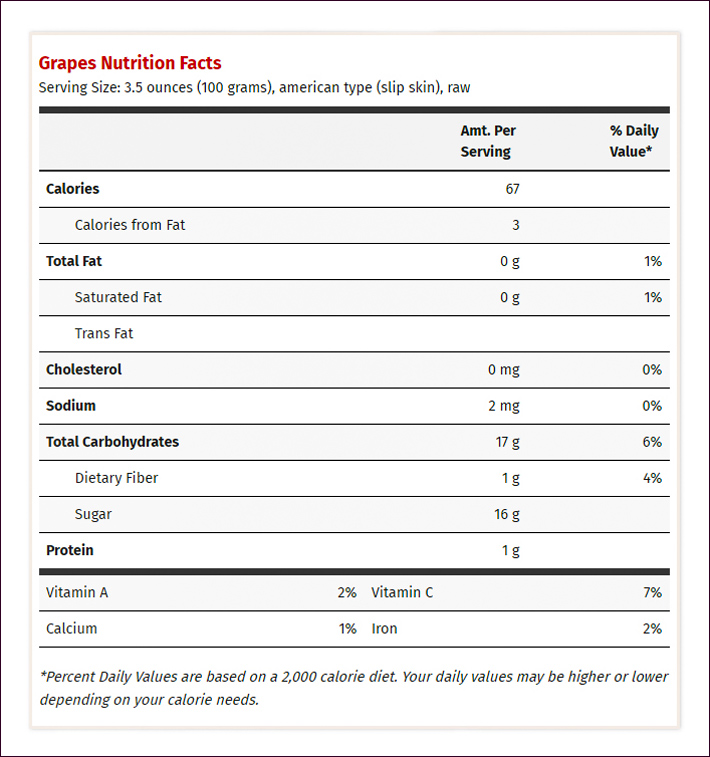
Grapes Health Benefits
When you think of a popular fruit with a myriad of uses, grapes might come to mind. Under the correct treatment and conditions, the “fruit of the vine” makes one of the most desirable beverages in the world. Dried grapes (raisins) can be a lovely addition to salads and yogurt. Fresh, seedless grapes can be used to make grape juice, and they’re a handy snack all by themselves.
Grown wild since the dawn of time in every continent but Antarctica, the three species of grapes are now categorized as European, North American, and French hybrids. Table grapes, usually seedless, are large with thin skins. Wine grapes contain seeds and are smaller with relatively thicker skins. White grapes are actually pale green.
A delicious lunchbox treat, grapes also contain health benefits for your heart, eyes, brain, blood, and joints (to name just a few areas of the body grapes are good for) with the seed and skin containing the richest concentration of antioxidants.
Grapes health benefits and nutrition facts
Like so many other plant-based foods, grapes can be considered healthy for a variety of reasons. They contain 17% of the daily value of vitamin K, and 33% in manganese, but the polyphenol resveratrol content represents one of the most important phytonutrients because of its ability to protect against colon and prostate cancers, coronary heart disease, degenerative nerve disease, and even Alzheimer’s.
Anthocyanins, another plentiful antioxidant polyphenolic in red grapes, generate anti-allergic, anti-inflammatory, antimicrobial, and anti-cancer activities. Oligopeptides (peptides or amino acids) with antibacterial properties, and catechins (a type of flavonoid antioxidants) found in white grape varieties, also abound with health-protecting properties.
Grapes inhibit “bad” LDL cholesterol and plaque build-up in the arteries. They are rich in micronutrient minerals like copper and manganese, an essential co-factor of the antioxidant enzyme superoxide dismutase. Grapes have a low glycemic index and contain the hormone and antioxidant melatonin, as well as about 191 mg of the electrolyte potassium per 100 grams. Iron is particularly concentrated in raisins.
Inflammation is the basis of many life-threatening diseases of the body. Messaging molecules (such as interleukin) and pro-inflammatory enzymes (like cyclo-oxygenase) that advance inflammation can be defused by grape intake.
However, consume grapes in moderation because they contain fructose, which may be harmful to your health in excessive amounts.

Studies Done on Grapes
In 2010, researchers reported that grapes and grape were products “clearly identified” as having the potential to positively influence and even help prevent heart disease, cancer, diseases affecting nerve cells in the brain, age-related cognitive decline, Alzheimer’s disease, and diabetes, with possible benefits for oral health, immune function, and antiviral activity as well. Studies attributed this to the antioxidant and flavonoid content in grapes and their ability to increase nitric oxide production.
Grape powder was shown to have a positive effect when tested on colon cancer patients, enough for researchers to determine that grapes may have colon cancer-preventative properties as well due to the reversatrol content.
Grape Fun Facts
William Wolfskill, a former Kentucky trapper, planted California’s first table grape vineyard in 1839 in a Mexican pueblo settlement, now called Los Angeles. While he was the first to ship fresh grapes to Northern California, 30 years later, an entrepreneur named R.B. Blowers posted the first 22-pound box of grapes from California to Chicago via the new transcontinental railroad. The same year, Dr. Thomas Bramwell Welch introduced unfermented grape juice – one of the biggest hits ever in the beverage department.
Summary
What food is a natural antimicrobial, contains anthocyanins, oligopeptides, catechins, superoxide dismutase, antioxidants, and other properties to prevent breast, prostate, and colon cancer as well as many other life-threatening diseases, while boosting cardiovascular and cognitive health, balancing blood sugar, and even encouraging longevity? The answer: grapes.
The big deal about antioxidants is their ability to eradicate harmful free radicals from cells that can cause oxidative stress, leading to all kinds of chronic illnesses. So eating grapes is a good way to provide your body with the phytonutrients that can protect you.
Research indicates that staying optimally nourished with the fewest calories might help you live longer, so this delicious fruit with easily hundreds of uses (especially if you count the wines) is one of the healthiest natural foods on the planet.







Leave a Reply